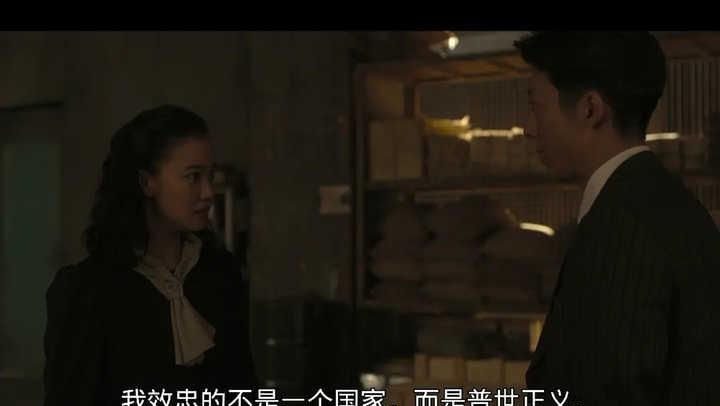It belongs to the story of describing the history of World War II from an outsider's point of view, but because it is the perspective of the wife, especially the first half is more like a family ethics film, it can also be seen that "women" and "wives" are also the themes that the director wants to discuss in addition to the war, perhaps not a pure war film, but at least, this Japanese film is rarely really anti-war rather than anti-war defeat. After witnessing the crime of Japan's 731 human experiment in Manchuria, the male protagonist spontaneously carried out espionage operations to expose the truth, hoping that this would prompt the United States to enter the war and make Japan lose quickly. "Will it kill your fellow citizens? Your fellow citizens are doing this kind of dehumanizing thing. "This is the right attitude for the aggressor to reflect, not that we are also miserable when we die."

If the perspective is all on the male protagonist, maybe this is a standard leftist anti-war film, and it is interesting to put the perspective on his wife. Here, women's rights are still not as great as men's, but they are not a completely out-of-state victim, allowing the state to destroy her small happiness in the opposite ideals of the husband, but actively participating in the husband's spy program. However, what is more interesting is that the reason why she is a spy, the justice in her heart does not know how much can be accounted for, more is her fanatical love for her husband, and she feels that she has become a unique accomplice of her husband. Originally, the motivation for exploring the truth of the matter was to be afraid of her husband's cheating, even after watching the Manchurian video to know the truth, she was still alert from time to time.
If the husband were not a left-wing cosmopolitan, but a brainwashed militarist, God knows what she would become again. So, when I see half of it, I still want to complain, the couple's mind is not together at all, so is it okay? As a result, a divine turn soon came, and the wife, who was also part of the husband's plan, was treated as an outcast. The husband anonymously reported his wife to buy time for himself to go to Shanghai, and also adjusted the Manchurian video he carried with his wife into a short film made by their family.
You want to say that the husband should be morally condemned for this matter, the wife also took the initiative to report the nephew in order to clear the husband's suspense, so that the nephew was tortured to force a confession and died, this time because of the replacement of the video tape, the wife not only did not die, in a sense, but also spared the pain of two weeks of smuggling, but also let the officers enjoy a wave of homemade romance films, "Why did this person deliberately bring this thing to smuggle into the United States." This scene is really impressive, not only allowing the contradiction between the husband and wife to erupt, but also making the military hall filled with continuous sad love songs, and the sense of irony is self-evident.
Of course, this incident must have a great emotional impact on his wife, who went to the screen and shouted "great" and fainted (the English subtitles of the festival are still bravo, more that taste), and then he was sent to a mental hospital. Struggle for ideals x struggle for love, although I think the director has the intention to explore gender, but I personally advocate that the brain is not gender-specific, so I don't like to talk about gender, just want to say as an audience, watching two brain circuits without interacting with people who have been on it is really interesting.
The scene in the mental hospital is actually five years after the scene in the military hall, 1945, which coincided with the surrender of Japan. Five years later, the story is very different from the front, but the scene of Kobe being attacked by air raids was filmed, which sublimated the anti-war theme. As for the wife, who was originally the easiest person to be seen through in the whole film five years ago, five years later, it began to be incomprehensible. It is estimated that in these five years, I have thought about a lot of things, when other women are complaining about the defeat of the war and the bad life, she is very calm without saying a word, and also said "In this country I have to go crazy." In the end, she stood in the fire of Kobe, and became a witness to the war like her husband, which may confirm her husband's previous words to comfort her: "The flesh is separated, but the distance of the soul is closer."